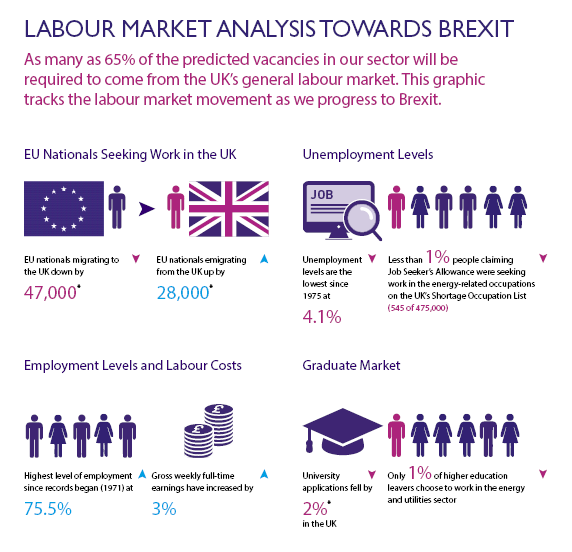USING LABOUR ECONOMIES (MICROECONOMIES AND / OR MACROECONOMIES), CRITICALLY DISCUSS POST-BREXIT LABOUR MARKET IN THE UK.
INTRODUCTION
Following Britain’s withdrawal from the European Union, we have seen high levels of long-term net migration in UK, and the sheer volume has given rise to public anxiety about pressure on public services, like schools, infrastructures, especially housing, as well as placing downward on wages for people on the lowest income.
POST-BREXIT LABOUR MARKET IN UK
Labor market is a key component of any economy and is intricately tied in with markets for goods, services and capital. At the macroeconomic level, demand and supply are influenced by local and global market forces, as well as factors such as immigration, the age of the population and levels of education (Staiger, 2016). The overall effects of Brexit on employment and the broader labor market in the UK will depend not just on migration flows, but also on the wider economic factors, such as trade patterns and business location decisions. Rumpel et al, (2013) disclosed that migrants from European Economic Community countries prefer cities or urban regions because of the employment opportunities.

IMPACT OF POST-BREXIT LABOUR MARKET IN UK
This assessment is important because both public opinions and literature show positive and negative impact of Post-Brexit labor market in the UK economy. Considering any sort of economic integration, four freedoms specific to internal markets are affected. Free movement of goods, services, persons and capitals. In this context, this research work shows that EU membership had a positive effect on the UK immigrants, because of free movement of goods, services, person and capital (Ebell et al, 2016). The most important consequences of Brexit would affect the movement of capital that will negatively affect business by bringing more uncertainty (Robinson, 2015). Economic theory proves that, mobility of production factors ensures better resource allocation at international level brings an increase in welfare (Grosu et al, 2016).
SHORT-TERM ECONOMIC IMPACT OF THE POST-BREXIT LABOUR MARKET IN UK
Before the referendum, there was predictions or economic forecasts by the treasury that a vote for Brexit would result to an immediate economic recession in UK. The bank of England’s Central forecast was for UK economy to keep growing, but Mark Carney the bank’s governor said that the risk of a vote to leave could possibly include a technical recession (Aichele et al, 2015). Since the referendum, business investment growth has slowed down. Data show that business investment in the first quarter of 2018 was only 2.3% a little higher than at the time of referendum, compared to the Bank of England forecast before referendum for 13% growth (Balcerzak, 2016 ).
LONG-TERM ECONOMIC IMPACT OF POST-BREXIT LABOUR MARKET IN UK
Those short-term forecast on the UK economy have attracted much consideration and criticism. Why? Because the economy did not go into recession as the gloomiest pre-referendum forecasts suggested; some people have cast doubt on all the pre-referendum forecasts that have been made by economists about the likely economic consequences of Brexit (Ortega &Peri, 2014). Although, the short-term economic forecasts on UK did not happen as predicted but the forecasts have laid a foundation to project what Brexit long-term imparts will be on the UK economy (Ottaviano et al, 2016). The long-term forecasts seek to address the question; “how much smaller or bigger will the UK economy be in 2030 following Brexit than it would have been, had the UK continued an EU member (Petroff, 2016)
CONCLUSION
As expected, this research work using labor economies to critically analyze Post-Brexit labour market in the UK showed that the Britain’s withdrawal from the European Union has both positive and negative impacted on the Post-Brexit labor market in UK, it has increased the number of immigrants from the CEE countries that are in the EU due to recession into UK and affected labor market in UK.
REFERENCES
Aichele, R., & Felbermayr, G. (2015). Kosten und Nutzeneines Austritts des Vereinigten Konigreichsaus der Europaischen Union. Munich University.
Balcerzak, A. P. (2016). Multiple-criteria Evaluation of Quality of Human Capital in the European Union Countries. Economics and Sociology, 9(2), 11-15. Doi:10. 14254/2071-789X.2016/9-2/1.
Ebell, M., & Warrant, J. (2016). The Long-term Economic Impact of Leaving the EU. National Institute Economic Review, 236(1),121-123. Doi:10.1177/002795011623600115.
Grosu, R. M., & Dinu, V. (2016). The Migration Process of Romanians to Andalusia, Spain. Focus on Socio-economic Implications. E&M Ekonomie a Management, 19(2), 21-23. Doi:10.15240/tul/001/2016-2-002.
Ortega, F., & Peri, G. (2014). Openness and Income: The Role of Trade and Migration. Journal of International Economics, 92(2), 231-234. Doi:10.1016/j.jinteco.2013.11.008.
For more academic help please check a wide range of services our Economics Writing Help team offers:
– Economics Assignment Writing Services
– Economics Essay Writing Services
– Economics Dissertation Writing Services
– Buy An Economics Research Paper
Students working on case studies or might need academic help, might find our custom Case Studies Writing Services helpful.






